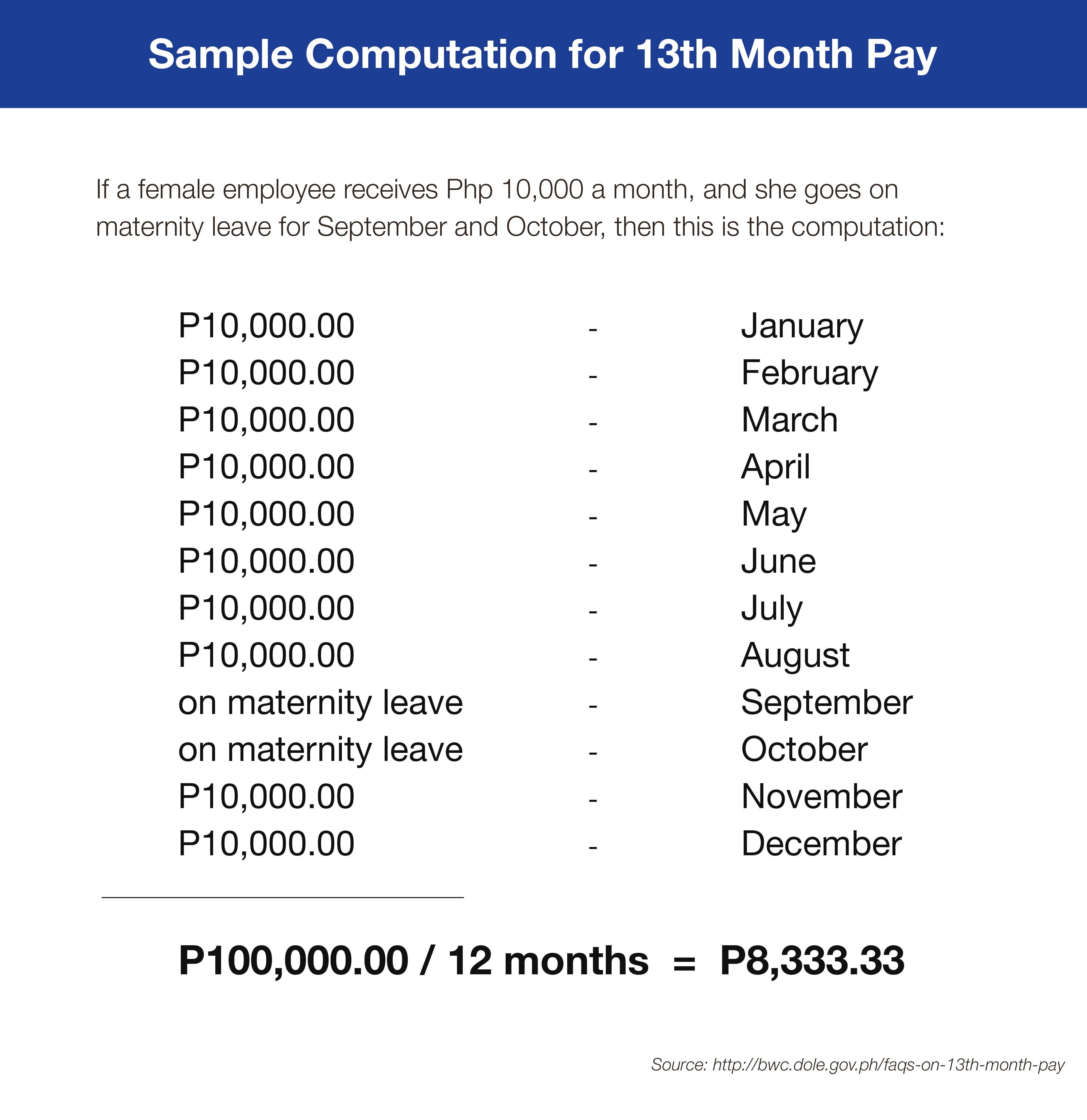How to compute 13th month pay (and other things you need to know)
It’s the three words every Filipino loves to hear: thirteenth-month pay. Just before December begins to roll in, the chant for the words become a little bit louder, until we finally see it credited to our paycheck. But what is 13th month pay exactly, and how do we compute it? In this article, we’ll take a look at everything we need to know about 13th month pay.
- What is 13th month pay?
- Who is eligible to receive the 13 month pay?
- What is the difference between a 13th month pay and a bonus?
- How to compute 13th month pay and other questions
- When is 13th month pay given?
- Conclusion
- FAQs
What is 13th month pay?
13th month pay is an extra payment given to all rank-and-file employees in the private sector at the end of the year. This extra payment is equal to 1/12 of the employee’s basic salary earned for the year. For employees who have worked an entire year for the same company, this is usually equivalent to one month's salary.
13th month pay is a mandatory benefit by the Philippine government in accordance with Presidential Decree No. 851.
Who is eligible to receive the 13 month pay?
Any rank-and-file employee who has worked at the company for at least one (1) month during the calendar year is eligible to receive a 13th month pay! It doesn’t matter if you’re probationary or have been regularized.
Exceptions
The following are not entitled to 13th month pay:
- Government employees
- Household helpers
- Manegerial employees
- Freelancers
Although employers are not legally required to provide these employees with 13th month pay, many still do just as a way to appreciate their services. Some also provide other monetary benefits to compensate.
What is the difference between a 13th month pay and a bonus?
The 13th month pay is a government-mandated employee benefit while a bonus is not. Bonus is simply an amount granted to an employee upon their employer’s discretion based on their performance on the job.
Your 13th month pay is not the same as a Christmas bonus or a 14th month pay. Employers are legally obligated to provide you with a 13th month pay if you are eligible. Meanwhile, they can choose whether or not to give bonuses at the end of the year.
For exempted employees like government workers, their 13th month pay would be classified as a bonus since they are technically not eligible for the benefit.
How to compute 13th month pay and other questions
Here are the steps to compute your 13th month pay:
- Add up all the basic salaries earned by the employee within the calendar year.
- 13th month pay = Total basic salary earned for the year/12
13th month pay sample computation
Here’s a sample computation. Let’s say an employee's total basic salary for the year is PHP 300,000:
- 13th month pay= PHP300,000/12
- 13th month pay =PHP25,000
Are maternity leaves included in the 13th month pay computation?
No, maternity leaves are not included in the 13th month pay computation.
For example, let’s say the employee’s monthly basic salary is PHP25,000 and she was on maternity leave for two months. Her total basic salary is now only PHP250,000.
- 13th month pay= PHP250,000/12
- 13th month pay= PHP20,833

Are resigned or terminated employees still eligible for 13th month pay?
Yes. If you resigned or left before the time for the payment of the 13th month, you’re still entitled to the benefit. The 13th month pay of a resigned or separated/terminated employee is proportionate to the length of time he/she has worked during the year, either from the time he/she has starting working during the calendar year or the time the last 13th month pay was given, up to the time of his/her resignation or separation/termination from the company.
Is 13th month pay taxable?
If your 13th month pay exceeds P90,000, then it is taxable and should be included in the computation of your income tax. If the total is below that amount, it is tax-free.
My employer has not paid my 13th month pay. What should I do?
If your employer fails to give you your 13th month pay, file a complaint to the Department of Labor and Employment (DOLE).
When is 13th month pay given?
The law states that it should be paid no later than December 24. However, some employers give half of the pay earlier in the year (to prepare for the opening of the academic year) and the other half just before Christmas.
For resigned or terminated employees, the 13th month pay is included in their final pay.
Conclusion
Being aware of 13th month pay is critical to know your rights and benefits, and calculating it accurately allows you verify what is owed to you by your employer. As Christmas approaches, let this extra boost to your paycheck fill you with holiday cheer. Consider it a much-deserved reward for a job well done throughout the year.
FAQs
- Am I eligible for 13th month pay?
Any rank-and-file employee who worked for at least one month during the year is eligible. This excludes government employees, household helpers, managerial staff, and freelancers.
- How is it different from a bonus?
13th month pay is mandatory, while bonuses are discretionary.
- How to compute it?
Add up your yearly basic salary and divide by 12.
- Are maternity leaves counted?
No, maternity leave is not counted in 13th month pay.
- What about resigned or terminated employees?
Resigned or terminated employees are entitled, proportionate to their service duration.
